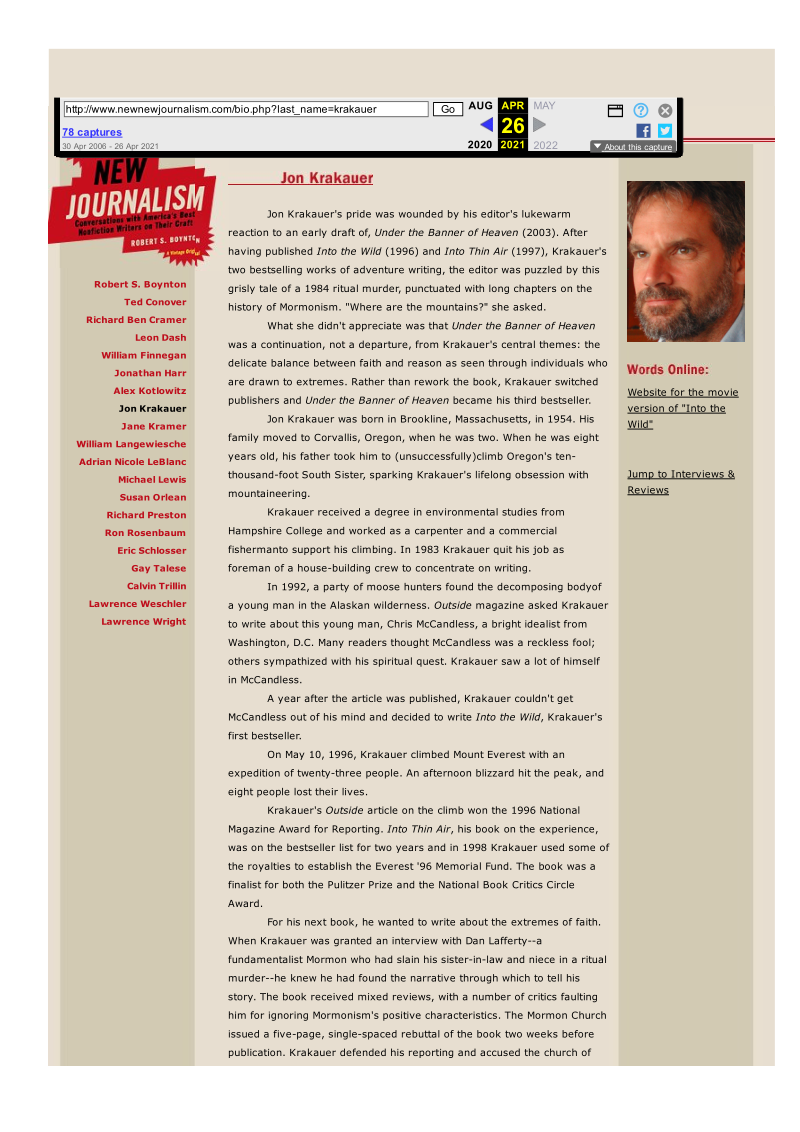Robert Boynton writes an article about Jon Krakauer; writes that he is an award-winning author and mentions achievements.
- Type
- Website
- Source
- Robert S. Boynton Non-LDS
- Hearsay
- Journalism
- Reference
"Jon Krakauer," The New New Journalism, accessed October 15, 2021
- Scribe/Publisher
- The New New Journalism
- Audience
- Reading Public
- Transcription
Jon Krakauer's pride was wounded by his editor's lukewarm reaction to an early draft of, Under the Banner of Heaven (2003). After having published Into the Wild (1996) and Into Thin Air (1997), Krakauer's two bestselling works of adventure writing, the editor was puzzled by this grisly tale of a 1984 ritual murder, punctuated with long chapters on the history of Mormonism. "Where are the mountains?" she asked.
What she didn't appreciate was that Under the Banner of Heaven was a continuation, not a departure, from Krakauer's central themes: the delicate balance between faith and reason as seen through individuals who are drawn to extremes. Rather than rework the book, Krakauer switched publishers and Under the Banner of Heaven became his third bestseller.
Jon Krakauer was born in Brookline, Massachusetts, in 1954. His family moved to Corvallis, Oregon, when he was two. When he was eight years old, his father took him to (unsuccessfully) climb Oregon's ten-thousand-foot South Sister, sparking Krakauer's lifelong obsession with mountaineering.
Krakauer received a degree in environmental studies from Hampshire College and worked as a carpenter and a commercial fisherman to support his climbing. In 1983 Krakauer quit his job as foreman of a house-building crew to concentrate on writing.
In 1992, a party of moose hunters found the decomposing body of a young man in the Alaskan wilderness. Outside magazine asked Krakauer to write about this young man, Chris McCandless, a bright idealist from Washington, D.C. Many readers thought McCandless was a reckless fool; others sympathized with his spiritual quest. Krakauer saw a lot of himself in McCandless.
A year after the article was published, Krakauer couldn't get McCandless out of his mind and decided to write Into the Wild, Krakauer's first bestseller.
On May 10, 1996, Krakauer climbed Mount Everest with an expedition of twenty-three people. An afternoon blizzard hit the peak, and eight people lost their lives.
Krakauer's Outside article on the climb won the 1996 National Magazine Award for Reporting. Into Thin Air, his book on the experience, was on the bestseller list for two years and in 1998 Krakauer used some of the royalties to establish the Everest '96 Memorial Fund. The book was a finalist for both the Pulitzer Prize and the National Book Critics Circle Award.
For his next book, he wanted to write about the extremes of faith. When Krakauer was granted an interview with Dan Lafferty--a fundamentalist Mormon who had slain his sister-in-law and niece in a ritual murder--he knew he had found the narrative through which to tell his story. The book received mixed reviews, with a number of critics faulting him for ignoring Mormonism's positive characteristics. The Mormon Church issued a five-page, single-spaced rebuttal of the book two weeks before publication. Krakauer defended his reporting and accused the church of whitewashing its history. "I wanted to write about how they dealt with their history. I didn't realize how rankled they would become about it."
In 2007, Sean Penn directed the movie version of "Into the Wild."
- Source Link
- http://web.archive.org/web/20210426041255/http://www.newnewjournalism.com/bio.php?last_name=krakauer
- Citations in Mormonr Qnas
The B. H. Roberts Foundation is not owned by, operated by, or affiliated with the Church of Jesus Christ of Latter-day Saints.

